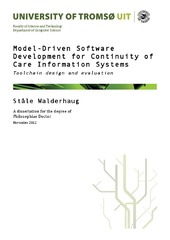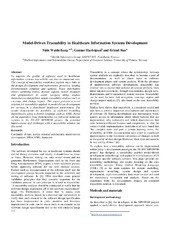| dc.contributor.advisor | Hartvigsen, Gunnar | |
| dc.contributor.author | Walderhaug, Ståle | |
| dc.date.accessioned | 2013-12-11T10:11:25Z | |
| dc.date.available | 2013-12-11T10:11:25Z | |
| dc.date.issued | 2013-03-13 | |
| dc.description.abstract | This thesis summarizes six years of design, development and evaluation of a model- driven development toolchain and design of software services for continuity of care. The overall research method has been design science, with a strong focus on creating and evaluating the core artefact: the ModelHealth Toolchain. Three iterations with toolchain design and assessments were deemed necessary to be able to draw valid conclusions about tool design and development mechanisms.
Using models for designing software is best practice in software engineering, but few developers are utilizing the models for code generation with model-driven development tools. The key benefits claimed for model-driven development clearly fits the challenges of developing reusable software service in healthcare. Nevertheless, the scientific knowledge on how to utilize model-driven development for creating standardized and reusable software in healthcare is scarce. Which features of model-driven development are useful? Should tools be adapted to the healthcare domain? Which type of software services can be reused? These are questions being addressed in this thesis.
The overall contributions of this thesis are
• A set of reusable software service designs for continuity of care, provided as open source
• The ModelHealth toolchain supporting model-driven development of continuity of care web services, including reusable model elements and UML Profiles
• A set of recommendations on how to tailor a model-driven development toolchain for domain such as continuity of care.
A final important contribution is the comprehensive documentation of a complete design science research project, where all the three research cycles are involved. This increases the body of literature on design science research in software engineering. | en |
| dc.description.doctoraltype | ph.d. | en |
| dc.description.popularabstract | Dette doktorgradsprosjektet presenterer resultatene fra utviklingen av en modell-drevet verktøykjede spesielt tilpasset utvikling av programvare for velferdstjenester. Verktøykjeden ble utviklet over en femårs periode med en serie evalueringer og oppdateringer. Arbeidet fulgte en "design science" metode med et sterkt fokus på relevans for sluttbruker. Som en del av evalueringen ble 25 gjenbrukbare programvare tjenester designet, utviklet og utprøvd i en kalenderapplikasjon for eldre/demente brukere i Trondheim. | en |
| dc.description | Papers 5, 7, 9 and 10 of this thesis are not available in Munin: <br/>5. haug, S., Stav, E., Johansen, U., Olsen, G.K.: 'Traceability in Modeldriven Software Development', In: Tiako, P.F. (ed.) Designing Software-Intensive Systems - Methods and Principles. pp. 133-160. IGI Global,
Information Science Reference(2008), available at <a href=http://dx.doi.org/10.4018/978-1-59904-699-0.ch006>http://dx.doi.org/10.4018/978-1-59904-699-0.ch006</a> <br/>7. Holthe, T., Walderhaug, S.: 'Older people with and without dementia participating in the development of an individual plan with digital calendar and message board', Journal of Assistive Technologies (2010), vol. 4(2):15-25, available at <a href=http://dx.doi.org/10.5042/jat.2010.0278>http://dx.doi.org/10.5042/jat.2010.0278</a> <br/>9. Stav, E., Walderhaug, S., Mikalsen, M., Hanke, S., Benc, I.: 'Development and evaluation of SOA-based AAL services in real-life environments: A case study and lessons learned', International Journal of Medical Informatics (2011), vol. 82(11):269–293, available at <a href=http://dx.doi.org/10.1016/j.ijmedinf.2011.03.007>http://dx.doi.org/10.1016/j.ijmedinf.2011.03.007</a> <br/>10. Walderhaug, S.: 'Evaluation of a Model-Driven Development Toolchain for Healthcare' (manuscript) | en |
| dc.identifier.isbn | 978-82-8236-090-6 | |
| dc.identifier.isbn | 978-82-8236-091-3 | |
| dc.identifier.uri | https://hdl.handle.net/10037/5597 | |
| dc.identifier.urn | URN:NBN:no-uit_munin_5294 | |
| dc.language.iso | eng | en |
| dc.publisher | Universitetet i Tromsø | en |
| dc.publisher | University of Tromsø | en |
| dc.rights.accessRights | openAccess | |
| dc.rights.holder | Copyright 2013 The Author(s) | |
| dc.rights.uri | https://creativecommons.org/licenses/by-nc-sa/3.0 | en_US |
| dc.rights | Attribution-NonCommercial-ShareAlike 3.0 Unported (CC BY-NC-SA 3.0) | en_US |
| dc.subject | VDP::Technology: 500::Information and communication technology: 550::Other information technology: 559 | en |
| dc.subject | VDP::Teknologi: 500::Informasjons- og kommunikasjonsteknologi: 550::Annen informasjonsteknologi: 559 | en |
| dc.subject | VDP::Mathematics and natural science: 400::Information and communication science: 420::System development and system design: 426 | en |
| dc.subject | VDP::Matematikk og Naturvitenskap: 400::Informasjons- og kommunikasjonsvitenskap: 420::Systemutvikling og -arbeid: 426 | en |
| dc.title | Model-Driven Software Development for Continuity of Care Information Systems - Toolchain design and evaluation | en |
| dc.type | Doctoral thesis | en |
| dc.type | Doktorgradsavhandling | en |


 English
English norsk
norsk






